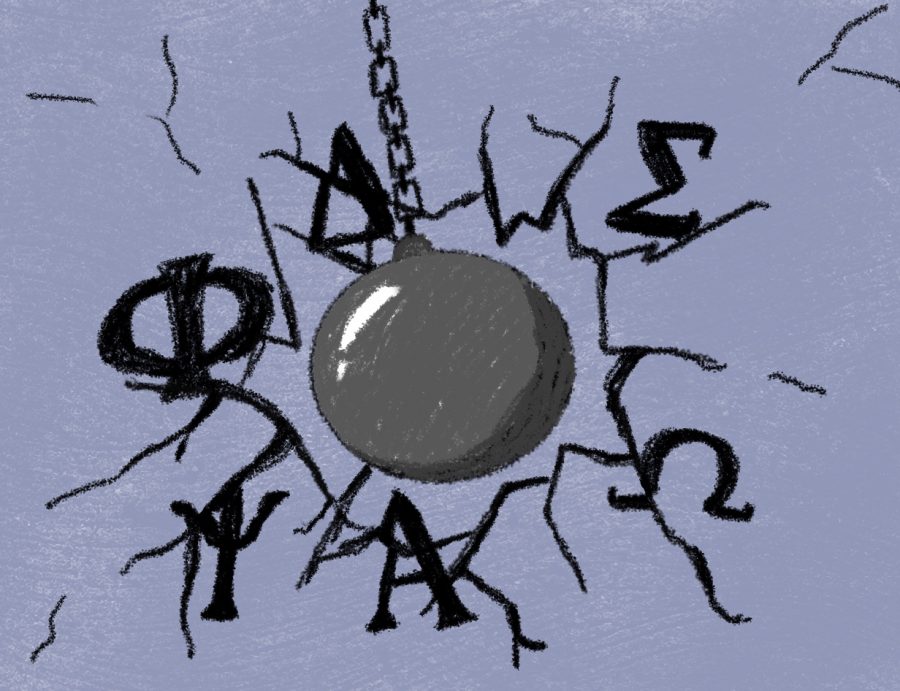Moratorium on Greek life extended until May 2024
June 25, 2021
The long-standing moratorium on Greek social life at Baruch College has been extended yet again, this time until May 31, 2024, as announced by Dean of Students Art King in an email blast to students.
“To continue ensuring the safety, security, and well-being of our students, the College has determined that it is necessary to extend the existing moratorium on pledging and rush activities in all Baruch social fraternities and sororities through May 31, 2024,” his email read in part. “This decision was reached after consultation with senior College administrators and the Undergraduate Student Government . In addition, the USG conducted an open forum and voted to recommend that the administration extend the moratorium for three years.”
A moratorium on social Greek fraternities and sororities has been in place and extended more than once since 2013.
It prevents organizations from attempting to recruit new members. Without the ability to recruit younger students, all of the previous members have long graduated and the organizations died off without new students to replenish their rosters.
It doesn’t officially de-charter them, which can only be done by the Undergraduate Student Government. It is something that the government has been hesitant to do in the past, as USG acknowledges that some students want to see Greek life brought back to campus.
The moratorium, which only affects Greek social organizations but not Greek honors or professional organizations, was first put into place after Baruch freshman Chun Hsien “Michael” Deng, 18, died in a hazing accident at an unsanctioned Pi Delta Psi fraternity event.
The event had been held off-campus without the Office of Student Life’s knowledge at a cabin in Pennsylvania as a weekend retreat.
While at the retreat, older members of the fraternity had pledging members participate in a hazing ritual called the “Glass Ceiling,” that has pledges walk blindfolded with a weighted backpack as the other members tackle them to the ground.
Deng died of bodily and brain injuries, for which four of his former fraternity brothers — Kenny Kwan, 28, Charles Lai, 26, Raymond Lam, 23, and Sheldon Wong, 24 — pled guilty to.
Since then, the moratorium has been the strongest action possible against Greek social life, unless USG one day decides to de-charter the organizations. It has been extended multiple times since 2013 for three-year increments.
“In deciding to extend the moratorium, we continue to bear in mind that first-year Baruch College student Chun Hsien ‘Michael’ Deng died needlessly in December 2013 as a result of a hazing ritual that occurred during an unsanctioned, secret fraternity event held in the Pocono Mountains,” King’s statement continued. “This senseless tragedy resulted in serious criminal charges being filed against a number of Baruch students, which led to guilty pleas, convictions, and upended lives and futures. We announce this decision to extend the moratorium until May 31, 2024, with Michael in our thoughts and the safety of all our students as a priority.”
Former Baruch President Mitchel Wallerstein shared a similar view with The Ticker back in March of 2019, when asked about the same topic.
“To be honest, I don’t see the value added for Baruch,” he said. “I don’t see what the Greek organizations contribute to campus life. I think there’s so many other clubs and organizations on the campus…And then you have the honor societies and all the other groups that exist. I just don’t see a need for Greek organizations on this campus.”
According to a more recent Ticker article regarding Greek social life, “USG members said that they didn’t receive sufficient time or knowledge to make the decision to reinstate Greek life at Baruch.”
Operations management major Frederick Tran shared his thoughts on the moratorium’s extension with The Ticker through Facebook Messenger.
“When I transferred to Baruch College and learned about the Greek moratorium and the reasoning behind it, I understood why there was a ban on Greek life and that the death of Michael Deng was tragic and should not have happened,” he said. “The act of hazing your peers is pointless, destructive and should be condemned by all means. Despite this, I believe wholeheartedly that not all Greek organizations are built on the same values and that the moratorium should not have been extended at all; especially after already being extended in 2018. The Undergraduate Student Government had not put into consideration the voices of those who opposed the moratorium and voted without any knowledge of the general public of the school.”
Tran went on to explain why he feels that Baruch should allow Greek social life on campus.
“Greek life is a stark difference from what the media portrays it to be. The value Greek organizations adds more to a student’s college experience. Becoming part of a Greek organization adds to what college students are looking for in college. These experiences include meeting a vast amount of new people, making strong friends that would last a lifetime, networking with people from a plethora of different industries across the United States, and generally becoming the best version of who you are,” he said. “Greek organizations give students a reason to stay on campus and be more involved within the school. These benefits of Greek life are extremely difficult to come by in a commuter school like Baruch College and has been tainted by the deceived portrayal of them. Greek organizations are actively being discriminated against despite ‘professional’ fraternities existing on campus as they do not operate any different from social Greek organizations. These ‘professional’ fraternities still pledge new members and initiate new members. There is no reason why all CUNYs except Baruch College has Greek life on campus and this act of discrimination should be condemned.”
Though it has been eight years since the establishment of the Greek life moratorium, USG and the administration have said that the decision to extend it was made in order to prevent the events that occurred in 2013 from happening again. When it comes time for a reevaluation of the moratorium in 2024, it will have to be seen whether or not the moratorium will be extended with these same thoughts in mind.








